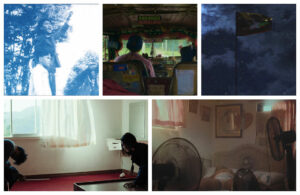By Brontë H. Lacsamana, Reporter
THE QCINEMA International Film Festival’s shorts program this year has expanded to a whopping 26 films, spread out across five sections. In QCShorts International 2, five filmmakers turn their attention to the realities that ignite pockets of resistance — within communities, families, and entire societies.
This specific program, titled “The Center Cannot Hold,” takes its name from Elyn Saks’ 2007 memoir on a tumultuous psychological journey, which in turn is named after a line from William Butler Yeats’ apocalyptic poem “The Second Coming.” Such is the lineage of losing grip on a centered reality, tuning into the voices of people that seek to fight back in the most unlikely of ways.
Besides offering glimpses into unexplored countrysides in Southeast Asia, these five films make up a fragmented yet interconnected — but admittedly overwhelming — experience.
VOX HUMANA
The experience begins with an invitation to listen. The setting is a landscape so dreamlike, with the wind ruffling the leaves in the trees, blowing through stalks of grass on the mountainous terrain. Forceful human voices, a storm of horses galloping in, a man’s nails tracing the rough grit on an old wall — images and sounds interrogate the ties that bind humans with the earth.
Don Eblahan’s poetic narrative, coming home from the Toronto International Film Festival, presents scenes of a futuristic ethnographic endeavor. A sound recordist listens, the authorities watch, the biologist is witness to the power of the indigenous. We can only look and listen to the reckoning amid the disconnect.
WHEN THE BLUES GOES MARCHING IN
This time, there is a straightforward conversation. The voice of a young man relays a harrowing dream to his father, whose experiences are unknown to us, but may possibly be a connecting thread in Indonesia’s history of restless energy, protest, rage, and hope. We see photographs of these events, rendered in blue cyanotype. We hear a student activist’s impassioned protest poem.
Beny Kristia’s personal documentary is intimate but also large in scope, as it traverses one person’s thoughts and feelings inside the larger story of a nation’s attempt to reorient itself. While simple and straightforward, it is a monument to memories of struggle that is full of heart.
A METAMORPHOSIS
A confusing yet intriguing watch is Lin Htet Aung’s lo-fi broadcast that mimics the aesthetics of Myanmar’s state television propaganda. It combines entrancing visuals, like distorted digital images and short fuzzy videos, with an old man’s voice singing a Burmese lullaby.
Coming across as almost eerie, it pulls back a (seemingly unmoving) curtain to unveil the strange liminal spaces that have emerged from a country under dictatorship. Using what has been a nationalist medium, this film fights back creatively, valiantly, though it also has potential as a video installation played on an old box television.
HOY, HOY, INGAT!
A recipient of the QCShorts 2025 grant, Norvin de los Santos’ ode to two siblings clawing their way out of urban poor miseries is the most entertaining and heartwarming short of the bunch. A precocious young girl and her hardworking older brother take a battered family jeepney to go on an adventure, an escape from the hell that is Manila.
Tales about the underprivileged don’t always get to be treated with such pure playfulness and empathy. In a world where the metropolis is forever under construction, the slums and jeepneys under threat of being swept away in favor of large commercial developments, Bhing and Baby’s story is a little dream that is worth seeing.
SI KARA: ANG BABAYE NGA NAG DABA-DABA
Set in Bacolod, Dale’s absurd comedy is another recipient of the QCShorts 2025 grant. It’s a showcase of what cinema out of Negros Occidental can offer, as the character of Kara undergoes a series of trials where the heat built up in her body becomes so unbearable the changes in her lifestyle and environment ramp up. It’s a riot to watch, as toxic pink human gases poison the rivers and rumble in the mountains.
Many of it is lowbrow humor, for sure, with endless poop and fart jokes. But a lot is expressed — the neon painted people in a club dancing to budots and the motionless body of Kara in a boiling-hot room — all reflecting a fever dream that has gripped Filipinos. Contending with a climate that grows hotter and a social landscape that grows more chaotic day by day, this short concludes a strong set that truly presents how people can resist larger forces with images imagined.
QCShorts International 2 is screening on Nov. 21, 3:45 p.m., at Fisher Mall, and 9:20 p.m., at Gateway 2.
